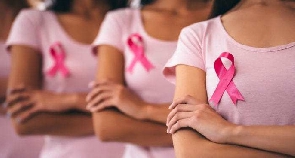 Every October is marked as Breast Cancer month
Every October is marked as Breast Cancer month
Mrs Juliette Mills-Lutterodt, President of Pink for Africa (PFA), a USA-based not-for-profit organisation and Breast Cancer Foundation, has advised women suffering from breast cancer to avoid aggravating their medical condition by seeking treatment from herbalists and Churches. “Don’t risk your condition with Herbalists and Churches” for the treatment and cure of breast cancer disease. Mrs. Mills-Lutterodt disclosed this to the Ghana News Agency (GNA), in an interview at an awareness creation of Breast Cancer with pupils and teachers of Roman Catholic (R.C) Mixed Primary School at Ho-Bankoe in the Ho Municipality of the Volta Region. She said they don’t have an antidote for the disease, but Doctors do; adding “though prayer is good, God gives the Doctor, the brain to be able to take care of you.” The President also asked them to regularly self-examine their breast especially, during menstruation periods for early detection of breast cancer for early remedy. She said during the examination if they found a lump in their breast, they should not panic, but rather seek medical attention for early cure. Mrs Mills-Lutterodt said PFA, which was primarily formed to educate and provide both emotional and financial support to women, in October every year visits Ghana for that assignment and that last year they were in Anloga District and this year Ho Municipality. She said there would be a donation to the Ho Teaching Hospital Oncology Department to support few women who needed assistance for diagnosis and treatment of Breast Cancer. Mrs Mills-Lutterodt told GNA that breast cancer was number one killer of women in Ghana, even though one per cent of the world population of men also gets cancer. The President reiterated the need for women to do self-screening for breast cancer; adding that in the month of October, almost every hospital in Ghana does free screening for breast cancer, so they should get examine. Madam Suzzy Mawuse Gbetsi, a teacher and participant, advised the pupils not to fear being screened as early detection saves lives.
Mrs Juliette Mills-Lutterodt, President of Pink for Africa (PFA), a USA-based not-for-profit organisation and Breast Cancer Foundation, has advised women suffering from breast cancer to avoid aggravating their medical condition by seeking treatment from herbalists and Churches. “Don’t risk your condition with Herbalists and Churches” for the treatment and cure of breast cancer disease. Mrs. Mills-Lutterodt disclosed this to the Ghana News Agency (GNA), in an interview at an awareness creation of Breast Cancer with pupils and teachers of Roman Catholic (R.C) Mixed Primary School at Ho-Bankoe in the Ho Municipality of the Volta Region. She said they don’t have an antidote for the disease, but Doctors do; adding “though prayer is good, God gives the Doctor, the brain to be able to take care of you.” The President also asked them to regularly self-examine their breast especially, during menstruation periods for early detection of breast cancer for early remedy. She said during the examination if they found a lump in their breast, they should not panic, but rather seek medical attention for early cure. Mrs Mills-Lutterodt said PFA, which was primarily formed to educate and provide both emotional and financial support to women, in October every year visits Ghana for that assignment and that last year they were in Anloga District and this year Ho Municipality. She said there would be a donation to the Ho Teaching Hospital Oncology Department to support few women who needed assistance for diagnosis and treatment of Breast Cancer. Mrs Mills-Lutterodt told GNA that breast cancer was number one killer of women in Ghana, even though one per cent of the world population of men also gets cancer. The President reiterated the need for women to do self-screening for breast cancer; adding that in the month of October, almost every hospital in Ghana does free screening for breast cancer, so they should get examine. Madam Suzzy Mawuse Gbetsi, a teacher and participant, advised the pupils not to fear being screened as early detection saves lives.